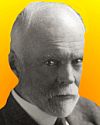 (source)
(source)
|
Edmund Beecher Wilson,
(19 Oct 1856 - 3 Mar 1939)
American zoologist.
|
Science Quotes by Edmund Beecher Wilson, (7 quotes)
During the half-century that has elapsed since the enunciation of the cell-theory by Schleiden and Schwann, in 1838-39, it has became ever more clearly apparent that the key to all ultimate biological problems must, in the last analysis, be sought in the cell. It was the cell-theory that first brought the structure of plants and animals under one point of view by revealing their common plan of organization. It was through the cell-theory that Kolliker and Remak opened the way to an understanding of the nature of embryological development, and the law of genetic continuity lying at the basis of inheritance. It was the cell-theory again which, in the hands of Virchaw and Max Schultze, inaugurated a new era in the history of physiology and pathology, by showing that all the various functions of the body, in health and in disease, are but the outward expression of cell-activities. And at a still later day it was through the cell-theory that Hertwig, Fol, Van Beneden, and Strasburger solved the long-standing riddle of the fertilization of the egg, and the mechanism of hereditary transmission. No other biological generalization, save only the theory of organic evolution, has brought so many apparently diverse phenomena under a common point of view or has accomplished more far the unification of knowledge. The cell-theory must therefore be placed beside the evolution-theory as one of the foundation stones of modern biology.
— Edmund Beecher Wilson,
In The Cell in Development and Inheritance (1896), 1.
Evolution on the large scale unfolds, like much of human history, as a succession of dynasties.
— Edmund Beecher Wilson,
In The Diversity of Life (1999), 94.
Not a single visible phenomenon of cell-division gives even a remote suggestion of qualitative division. All the facts, on the contrary, indicate that the division of the chromatin is carried out with the most exact equality.
— Edmund Beecher Wilson,
In The Cell in Development and Inheritance (1896), 306.
The great scientists have been occupied with values—it is only their vulgar followers who think they are not. If scientists like Descartes, Newton, Einstein, Darwin, and Freud don’t “look deeply into experience,” what do they do? They have imaginations as powerful as any poet’s and some of them were first-rate writers as well. How do you draw the line between Walden and The Voyage of the Beagle? The product of the scientific imagination is a new vision of relations—like that of the artistic imagination.
— Edmund Beecher Wilson,
In a letter to Allen Tate, July 20, 1931.
The nucleus cannot operate without a cytoplasmic field in which its peculiar powers may came into play; but this field is created and moulded by itself. Both are necessary to development; the nucleus alone suffices for the inheritance of specific possibilities of development.
— Edmund Beecher Wilson,
The Cell in Development and Inheritance (1896), 327.
The precise equivalence of the chromosomes contributed by the two sexes is a physical correlative of the fact that the two sexes play, on the whole, equal parts in hereditary transmission, and it seems to show that the chromosomal substance, the chromatin, is to be regarded as the physical basis of inheritance. Now, chromatin is known to be closely similar to, if not identical with, a substance known as nuclein (C29H49N9O22, according to Miescher), which analysis shows to be a tolerably definite chemical compased of nucleic acid (a complex organic acid rich in phosphorus) and albumin. And thus we reach the remarkable conclusion that inheritance may, perhaps, be effected by the physical transmission of a particular chemical compound from parent to offspring.
— Edmund Beecher Wilson,
In An Atlas of the Fertilization and Karyokinesis of the Ovum (1895), 4.
These facts shaw that mitosis is due to the co-ordinate play of an extremely complex system of forces which are as yet scarcely comprehended. Its purpose is, however, as obvious as its physiological explanation is difficult. It is the end of mitosis to divide every part of the chromatin of the mother-cell equally between the daughter-nuclei. All the other operations are tributary to this. We may therefore regard the mitotic figure as essentially an apparatus for the distribution of the hereditary substance, and in this sense as the especial instrument of inheritance.
— Edmund Beecher Wilson,
The Cell in Development and Inheritance (1896), 86.
Quotes by others about Edmund Beecher Wilson, (1)
Edmund Wilson attacked the pedantry of scholarly editions of literary classics, which (he claimed) took the pleasure out of reading. Extensive footnotes … spoiled the reader’s pleasure in the text. Wilson’s friend Lewis Mumford had compared footnote numbers … to “barbed wire” keeping the reader at arm’s length.
In Academic Instincts (2001), 39.
See also:
- 19 Oct - short biography, births, deaths and events on date of Wilson's birth.
 In science it often happens that scientists say, 'You know that's a really good argument; my position is mistaken,' and then they would actually change their minds and you never hear that old view from them again. They really do it. It doesn't happen as often as it should, because scientists are human and change is sometimes painful. But it happens every day. I cannot recall the last time something like that happened in politics or religion.
(1987) --
In science it often happens that scientists say, 'You know that's a really good argument; my position is mistaken,' and then they would actually change their minds and you never hear that old view from them again. They really do it. It doesn't happen as often as it should, because scientists are human and change is sometimes painful. But it happens every day. I cannot recall the last time something like that happened in politics or religion.
(1987) -- 


